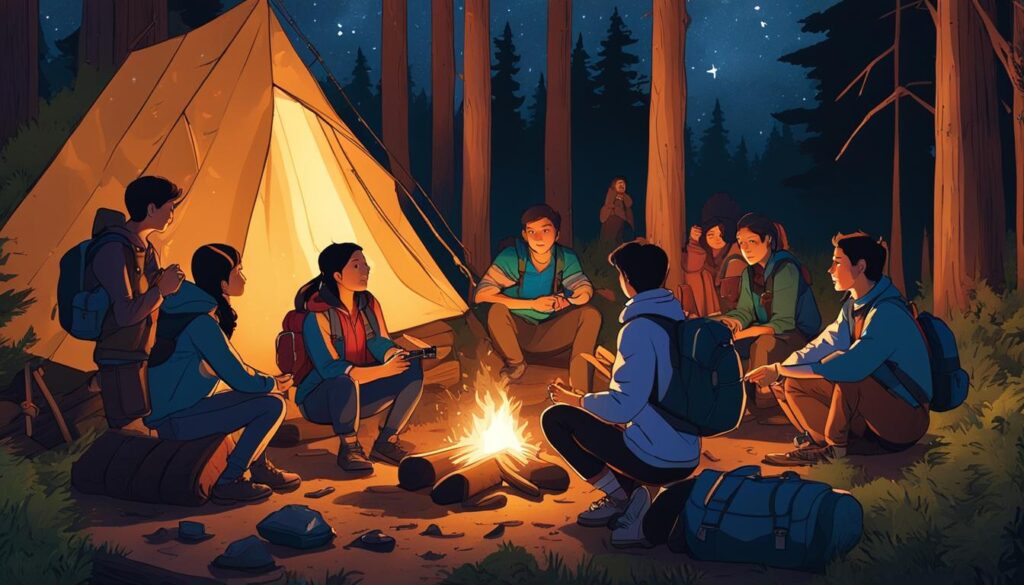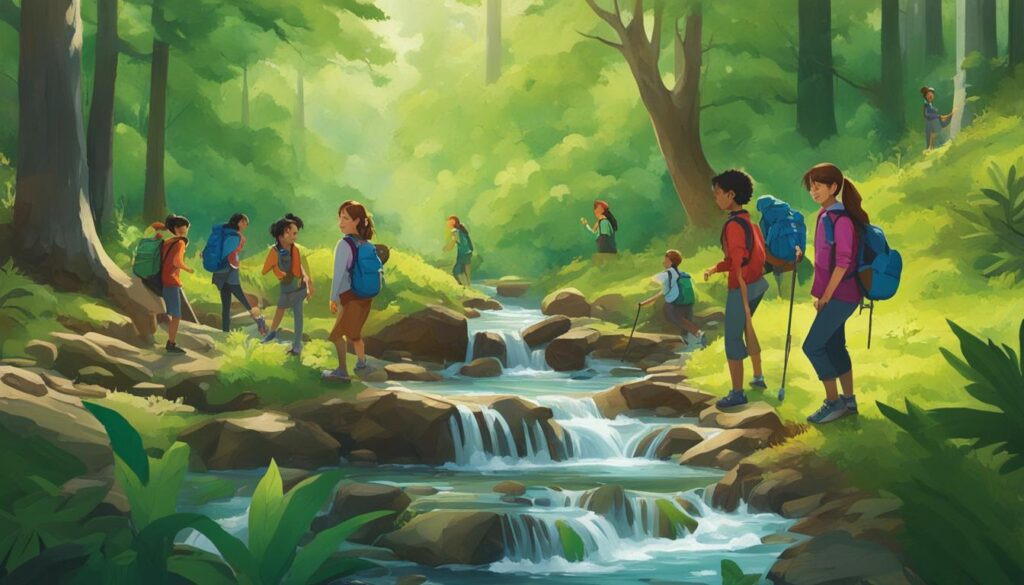Outdoor Education is a transformative approach to learning that takes students beyond the confines of traditional classrooms. This article explores the various ways in which outdoor education enhances learning and provides hands-on, nature-based experiences for students. From engaging the senses through direct experience to fostering adaptability and problem-solving skills, outdoor education programs offer unique opportunities for students to acquire modern skills and thrive in an ever-changing world.
Key Takeaways:
- Outdoor education goes beyond traditional classrooms to provide hands-on, nature-based experiences.
- Engaging the senses through direct experience enhances learning and retention.
- Outdoor education programs foster adaptability and problem-solving skills.
- Nature-based learning fills the digital literacy gap and prepares students for the modern workforce.
- Integrating outdoor education into school curricula promotes interdisciplinary learning and real-world application.
The Importance of Experiential Learning in Outdoor Settings
Experiential learning is a key component of outdoor education programs. By engaging the senses through direct experience, students are actively involved in their learning process, which enhances their ability to retain information. Outdoor settings provide a rich environment for experiential learning, allowing students to interact with nature and apply their knowledge in real-world contexts. The sensory stimulation and environmental interaction fostered through outdoor education activities lead to deeper learning and a greater connection to the natural world.
Engaging the Senses Through Direct Experience
Experiential learning in outdoor settings involves hands-on activities that engage all the senses. Whether it’s observing plants and wildlife, feeling different textures, or listening to the sounds of nature, students have the opportunity to fully immerse themselves in their learning environment. This multi-sensory approach not only enhances their understanding of concepts but also makes the learning experience more memorable and impactful.
The Role of Environmental Interaction in Learning Retention
Interacting with the environment is a powerful way to enhance learning retention. When students apply their knowledge in real-world contexts, they gain a deeper understanding of concepts and develop critical thinking skills. Outdoor education activities provide opportunities for students to solve problems, make observations, and draw connections between their academic learning and the natural world. This hands-on approach facilitates long-term retention of information and encourages a genuine appreciation for the environment.
| Benefits of Experiential Learning in Outdoor Settings | Examples of Outdoor Education Activities |
|---|---|
|
|
Outdoor Education Programs and Modern Skill Acquisition
Outdoor education programs play a crucial role in addressing the digital literacy gap among students. By providing nature-based education, these programs offer immersive learning experiences that complement traditional classroom learning and promote technological readiness.
Through outdoor education curriculum, students have the opportunity to engage with the natural world and develop a deeper understanding of environmental concepts. This hands-on approach fosters a sense of appreciation and stewardship for the environment, equipping students with the knowledge and skills to become responsible global citizens. Environmental education is a significant component of outdoor education programs, creating awareness of environmental issues and promoting sustainable practices.
In addition to environmental education, outdoor learning experiences also foster adaptability and problem-solving skills. By exposing students to unpredictable and challenging environments, outdoor education programs encourage them to think creatively, adapt to changing circumstances, and find innovative solutions.

Addressing the Digital Literacy Gap Through Nature-Based Education
One of the key benefits of outdoor education programs is their ability to bridge the digital literacy gap. In today’s technology-driven world, students need to be proficient in digital skills to succeed academically and in their future careers. However, excessive screen time and digital dependency can limit students’ exposure to nature and hinder their overall development.
Outdoor education programs provide a balance by incorporating nature-based learning experiences that promote technological readiness alongside hands-on activities. By integrating technology into outdoor learning, students can develop digital skills while still engaging with the natural environment. This approach not only addresses the digital literacy gap but also enhances students’ overall learning experience, allowing them to develop a holistic set of skills.
Fostering Adaptability and Problem-Solving Skills
The modern world is characterized by constant change and uncertainty. To thrive in this dynamic environment, students need to develop adaptability and problem-solving skills. Outdoor education programs provide the perfect platform for students to cultivate these essential skills.
Through outdoor adventures and challenges, students are exposed to unpredictable and unfamiliar situations that require them to think on their feet, adapt their strategies, and find innovative solutions. Whether it’s navigating a challenging hiking trail or working as a team to complete a ropes course, these experiences push students outside their comfort zones and encourage them to embrace change.
Furthermore, outdoor education programs promote critical thinking and problem-solving through real-world applications. Students are encouraged to analyze complex situations, consider multiple perspectives, and make informed decisions. These skills are transferable to a wide range of contexts and are essential for success in the modern workforce.
Integration of Outdoor Education into School Curricula
Integrating outdoor education into school curricula is crucial for maximizing its benefits. By incorporating interdisciplinary learning, outdoor education allows students to make connections between different subjects and develop a holistic understanding of complex issues. It broadens their global perspectives by exposing them to diverse environments and cultures. Moreover, outdoor education provides ample opportunities for the real-world application of textbook theories, bridging the gap between theoretical knowledge and practical skills.
Interdisciplinary Learning and Global Perspectives
Outdoor education encourages interdisciplinary learning, where students can explore and understand the interconnectedness of various subjects. By engaging in hands-on outdoor activities, students can see how different concepts and principles from multiple disciplines, such as science, geography, and history, intersect and influence real-world situations. This interdisciplinary approach fosters a holistic understanding of complex issues and prepares students to think critically and creatively in an ever-changing world.
Real-World Application of Textbook Theories
Incorporating outdoor education into school curricula provides students with opportunities to apply textbook theories in real-world contexts. Outdoor settings offer practical environments where students can directly observe and analyze the applications of scientific principles, mathematical concepts, and language skills. By engaging in outdoor activities that require problem-solving, critical thinking, and communication, students gain a deeper understanding of how theoretical knowledge translates into real-world scenarios. This real-world application not only enhances students’ learning experience but also prepares them for future challenges and careers that require practical skills and adaptable thinking.
| Benefits of Integrating Outdoor Education into School Curricula | |
|---|---|
| Enhanced understanding of complex issues through interdisciplinary learning | ✓ |
| Development of global perspectives through exposure to diverse environments and cultures | ✓ |
| Application of textbook theories in real-world contexts | ✓ |
| Promotion of critical thinking, problem-solving, and adaptability | ✓ |
| Preparation for future challenges and careers | ✓ |
The Benefits of Nature-Based Learning for Student Wellbeing
Nature-based learning provides numerous benefits for student wellbeing. Spending time in natural environments has been proven to reduce stress, improve mental health, and enhance overall wellbeing. The calming effect of nature helps students relax and recharge, promoting a positive state of mind that supports their emotional and psychological wellbeing.
Outdoor learning experiences allow students to connect with nature on a deeper level, fostering a sense of curiosity, wonder, and appreciation for the natural world. Engaging with the natural environment encourages students to explore, ask questions, and develop a sense of awe and respect for the Earth’s ecosystems.

In addition to the mental and emotional benefits, outdoor activities also contribute to physical fitness and healthy lifestyles. Outdoor learning experiences give students the opportunity to engage in physical activities, such as hiking, gardening, or team sports, which promote physical fitness and active living. Regular physical activity has been shown to improve overall wellbeing, including cardiovascular health, muscle strength, and mood.
By incorporating nature-based learning into their education, students can experience the holistic benefits of being in the outdoors. Outdoor learning not only enhances academic knowledge but also nurtures students’ overall wellbeing, fostering a lifelong connection to nature and promoting a healthy and balanced lifestyle.
How Adventure Learning Cultivates Leadership and Teamwork
Adventure learning is an integral part of outdoor education programs, offering students the opportunity to develop essential skills such as leadership and teamwork. Through outdoor challenges and activities, students are able to build trust and collaboration as they work together to overcome obstacles and achieve common goals.

Building Trust and Collaboration Through Outdoor Challenges
Outdoor challenges provide a unique platform for students to develop trust and collaboration skills. In unfamiliar and often unpredictable environments, students have to rely on each other and communicate effectively to successfully tackle the challenges at hand. This fosters a sense of camaraderie and teamwork, enabling students to form strong relationships and work cohesively as a group.
Moreover, outdoor challenges push students to step out of their comfort zones and take calculated risks. By engaging in activities that require teamwork, problem-solving, and decision-making, students develop resilience and self-confidence. They learn to trust their own abilities and the abilities of their peers, contributing to personal growth and enhanced leadership potential.
Realizing Potential Beyond Academic Metrics
Adventure learning extends beyond traditional academic metrics, providing students with the opportunity to explore and realize their full potential. Outdoor education programs promote holistic development, emphasizing skills and attributes that may not be evident within the confines of a classroom.
Through adventure learning, students are able to showcase their leadership abilities, think creatively, and adapt to changing circumstances. They learn to embrace challenges, persevere through adversity, and become more self-aware. These experiences help students discover talents and capabilities that go beyond textbooks and exams, allowing them to unlock their true potential.
Adventure learning equips students with valuable skills that are transferable to various aspects of life. Whether it be in future academic pursuits, careers, or personal endeavors, the leadership and teamwork abilities developed through outdoor education programs set students apart, enabling them to thrive in dynamic and collaborative environments.
Outdoor Learning Adventures Education and Student Engagement
Outdoor learning adventures education provides a unique and captivating approach to student engagement. Through hands-on experiences and immersive outdoor activities, students are inspired to become passionate learners, driven by curiosity and a love for learning.
These outdoor education programs create lasting memories that go beyond the classroom walls. Students create connections with nature and their peers, forging bonds that ignite their enthusiasm for learning. Whether it’s navigating a hiking trail, discovering wildlife, or conducting experiments in the natural environment, these adventures cultivate a deep appreciation for the world around them.
Inspiring stewardship of the environment is another essential aspect of outdoor learning adventures education. Students develop a sense of responsibility for the preservation and protection of our natural world. By witnessing the beauty and fragility of our ecosystems firsthand, they are motivated to take action and become advocates for environmental conservation.
Outdoor learning adventures education empowers students to play an active role in their communities and make a positive impact. With a deep passion for learning and a commitment to environmental stewardship, students are well-equipped to create a sustainable future.
| Benefits of Outdoor Learning Adventures Education | Description |
|---|---|
| Enhanced student engagement | Hands-on experiences and immersive activities foster curiosity and enthusiasm for learning. |
| Creation of lifelong memories | Outdoor adventures form lasting connections with nature and peers, leaving a lasting impact on students’ lives. |
| Inspiration for environmental stewardship | Students develop a deep appreciation for the environment and a sense of responsibility for its protection. |
| Promotion of active citizenship | Passionate learners are motivated to make a positive impact and contribute to their communities. |
Strategies for Incorporating Outdoor Learning Activities Daily
Incorporating outdoor learning activities into daily routines is essential for reaping the benefits of outdoor education. By transforming everyday spaces into learning opportunities, teachers can leverage outdoor environments to enhance student engagement and promote active learning.
Transforming Everyday Spaces into Learning Opportunities
Outdoor learning doesn’t have to be limited to a dedicated outdoor classroom. By incorporating outdoor activities into existing spaces, such as schoolyards, playgrounds, or nearby parks, educators can create dynamic environments that foster curiosity and exploration. For example, a simple math activity can be transformed into an outdoor scavenger hunt, where students search for shapes, patterns, or numbers in their surroundings.
Additionally, science experiments can be conducted outdoors, allowing students to observe natural phenomena like plant growth, weather patterns, or animal behavior firsthand. This hands-on approach not only deepens students’ understanding of scientific concepts but also cultivates a sense of wonder and appreciation for the natural world.
Making Outdoor Learning Accessible and Inclusive
Outdoor learning should be accessible and inclusive for all students, regardless of their abilities or backgrounds. Educators can take several steps to ensure that outdoor education is accessible and inclusive:
- Consider physical accessibility: Provide ramp access, accessible pathways, and seating options for students with mobility challenges to ensure equal participation in outdoor activities.
- Promote cultural sensitivity: Incorporate diverse perspectives and cultural references in outdoor learning materials and activities to create an inclusive learning environment.
- Address individual needs: Take into account the individual needs of students, such as sensory sensitivities or learning disabilities, and provide appropriate accommodations or alternatives to ensure their full engagement and participation.
By creating inclusive outdoor learning environments, educators can ensure that every student has the opportunity to participate and benefit from the valuable experiences offered by outdoor education.
| Incorporating Outdoor Learning Activities | Benefits |
|---|---|
| Outdoor scavenger hunts |
|
| Nature-based experiments |
|
| Adapting outdoor spaces for accessibility |
|
Measuring the Impact of Outdoor Educational Activities on Learning Outcomes
The impact of outdoor education can be assessed by measuring various learning outcomes that students gain from participating in outdoor educational activities. These assessments provide essential insights into the effectiveness of outdoor education programs and allow educators to tailor instructional strategies to enhance student development. By analyzing learning outcomes, educators can identify areas for improvement and provide evidence of the positive impact of outdoor education on students’ overall growth and success.
Assessing the impact of outdoor educational activities involves evaluating cognitive, social, emotional, and physical benefits. Cognitive outcomes encompass the acquisition of knowledge, critical thinking skills, problem-solving abilities, and academic performance. Social outcomes focus on the development of interpersonal skills, collaboration, teamwork, and effective communication. Emotional outcomes examine the impact of outdoor education on students’ self-esteem, resilience, and emotional well-being. Physical outcomes explore the effects of outdoor activities on students’ physical fitness, health, and overall well-being.
Effective assessment methods for measuring learning outcomes in outdoor education include:
- Pre and post-tests: Evaluating students’ knowledge and skills before and after participating in outdoor activities to assess growth and improvement.
- Observation: Observing students’ behavior, interactions, and engagement during outdoor experiences to assess social and emotional development.
- Self-reflection: Encouraging students to reflect on their learning experiences, identify personal growth, and set goals for future development.
- Surveys and questionnaires: Collecting feedback from students, parents, and educators to gather insights on the perceived impact of outdoor education.
- Case studies and interviews: Conducting in-depth interviews and analyzing case studies of students to gain a deeper understanding of the individual impact of outdoor education.
By employing these assessment methods, educators can gather valuable information on the impact of outdoor educational activities on learning outcomes. This data can guide future program development, inform instructional strategies, and provide evidence of the benefits of outdoor education in fostering students’ holistic development.
“Measuring learning outcomes in outdoor education helps educators understand the real effects of nature-based experiences on student growth and development.” – John Peterson, Outdoor Education Specialist
Cultivating Ecological Intelligence Through Outdoor Education Resources
Enhancing Environmental Awareness Amongst Youth
Outdoor education plays a crucial role in cultivating ecological intelligence among students. By immersing themselves in nature, students develop a deeper understanding of the environment and learn to appreciate its intricacies. They gain firsthand experience of ecosystems, biodiversity, and the delicate balance of nature. Through outdoor education programs, students enhance their environmental awareness and foster a sense of responsibility for the natural world.
Interactive Resources for Experiential Environmental Education
To actively engage students in environmental education, outdoor education programs provide a range of interactive resources. These resources include hands-on activities, field trips, and partnerships with environmental organizations. Hands-on activities allow students to explore environmental concepts through experiential learning, encouraging them to think critically and develop problem-solving skills. Field trips offer opportunities for students to observe and analyze natural environments, further deepening their understanding of ecological systems. Partnerships with environmental organizations provide access to experts and real-world examples of sustainable practices, inspiring students to take action for environmental conservation.
Community Involvement in Advancing Outdoor Education Curriculum
Community involvement plays a vital role in advancing the outdoor education curriculum. By establishing partnerships between schools and local organizations, we can integrate community expertise into hands-on learning experiences. These collaborations provide students with authentic learning opportunities and real-world connections that enhance their understanding of outdoor education.
Partnerships Between Schools and Local Organisations
Partnering with environmental nonprofits, outdoor recreation facilities, and local experts enriches the outdoor education curriculum. These partnerships allow students to learn from professionals who have specialized knowledge and experience in outdoor education. Whether it’s participating in conservation projects with environmental organizations or taking field trips to local natural sites, these collaborations bring the curriculum to life and expose students to diverse perspectives and resources.
Leveraging Community Expertise for Hands-On Learning
By leveraging the expertise within the community, outdoor education can provide hands-on learning experiences that connect students to their surroundings. Local experts can lead workshops, give guest lectures, or serve as mentors, offering valuable insights and guidance to students. This hands-on approach fosters a deeper understanding of outdoor education concepts and enables students to apply their knowledge in practical situations.
Conclusion: The Future of Learning Beyond Four Walls
The future of education is undergoing a transformative shift as we reimagine learning beyond the traditional four walls of a classroom. In a dynamic world that demands adaptability and innovation, outdoor experiences and outdoor education programs play a crucial role in preparing students for success. By incorporating outdoor education into curricula, educators can personalize learning and equip students with the skills and mindset needed to thrive in an ever-changing society.
Outdoor experiences offer unique opportunities for holistic development, providing students with hands-on, nature-based learning experiences that foster curiosity, engagement, and lifelong learning. Through direct interaction with the natural environment, students engage their senses, deepen their understanding, and forge a deep connection with the world around them. Outdoor education encourages students to become active participants in their own learning journey, igniting a passion for discovery and a sense of stewardship for the environment.
By embracing outdoor education, we can create a brighter future for our students—one that goes beyond academic achievement and prepares them to be compassionate, innovative, and resilient global citizens. As we reimagine education, let us seize the power of outdoor experiences and the immense potential they hold in personalizing learning and inspiring students to make a positive impact in the world. Together, let us embrace the future of learning beyond four walls and unlock the full potential of each and every student.
FAQ
How does outdoor education enhance learning?
Outdoor education enhances learning by providing hands-on, nature-based experiences that engage the senses and foster adaptability and problem-solving skills. It offers unique opportunities for students to acquire modern skills and thrive in an ever-changing world.
What is experiential learning?
Experiential learning is a key component of outdoor education programs. It involves actively engaging students in their learning process through direct experience. Outdoor settings provide a rich environment for experiential learning, allowing students to interact with nature and apply their knowledge in real-world contexts.
How does outdoor education address the digital literacy gap?
Outdoor education programs provide nature-based education that complements traditional classroom learning and promotes technological readiness. By offering immersive learning experiences, outdoor education programs foster adaptability and problem-solving skills, which are essential in the modern workforce and for navigating real-world challenges.
How does outdoor education integrate into school curricula?
Outdoor education promotes interdisciplinary learning by encouraging students to make connections between different subjects and develop a holistic understanding of complex issues. It also provides opportunities for the real-world application of textbook theories, bridging the gap between theoretical knowledge and practical skills.
What are the benefits of nature-based learning for student well-being?
Nature-based learning reduces stress, improves mental health, and enhances overall well-being. Outdoor learning experiences allow students to connect with nature, fostering a sense of calmness, curiosity, and appreciation for the natural world. Outdoor activities also promote physical fitness and healthy lifestyles.
How does adventure learning cultivate leadership and teamwork?
Adventure learning in outdoor education programs develops leadership and teamwork skills by providing opportunities for students to overcome obstacles and achieve common goals. Through outdoor challenges, students build trust and collaboration, boosting their self-confidence and resilience beyond academic metrics.
How does outdoor learning adventures education engage students?
Outdoor learning adventures education provides hands-on experiences and creates lifelong memories, sparking students’ curiosity and passion for learning. These experiences also foster a sense of stewardship for the environment, instilling in students a deep appreciation and responsibility for protecting and preserving our natural world.
How can outdoor learning activities be incorporated into daily routines?
Outdoor learning activities can be incorporated into daily routines by transforming everyday spaces into learning opportunities. Teachers can leverage outdoor environments to enhance student engagement and promote active learning. It is important to make outdoor learning accessible and inclusive for all students, considering factors such as physical accessibility and individual needs.
How can the impact of outdoor educational activities be measured?
The impact of outdoor educational activities can be measured by analyzing learning outcomes. Various assessment methods can be employed to determine the cognitive, social, emotional, and physical benefits that students gain from participating in outdoor education. This allows educators to identify areas of improvement and tailor instructional strategies.
How does outdoor education cultivate ecological intelligence?
Outdoor education enhances environmental awareness and fosters a sense of responsibility for the natural world. By providing interactive resources for experiential environmental education, outdoor education programs enable students to actively engage with environmental issues and explore sustainable solutions. This comprehensive understanding encourages students to become advocates for environmental conservation.
Why is community involvement important in advancing outdoor education curriculum?
Community involvement in outdoor education curriculum strengthens the relationship between schools and their local communities. Establishing partnerships with local organizations allows for the integration of community expertise into hands-on learning experiences. This collaboration enriches the outdoor education curriculum by providing students with authentic learning opportunities and real-world connections.
How can education be reimagined to prepare students for a dynamic world?
Education can be reimagined by embracing outdoor experiences and incorporating outdoor education into curricula. Personalizing education through outdoor experiences provides students with the skills and mindset needed to thrive in an ever-changing society. By offering unique opportunities for holistic development, engagement, and lifelong learning, outdoor education creates a brighter future for students.
Source Links
- https://www.internationalschoolparent.com/articles/learning-beyond-classroom-walls-nurturing-holistic-development-through-outdoor-education/
- https://files.eric.ed.gov/fulltext/ED264067.pdf
- https://scoonews.com/news/beyond-the-classroom-walls-the-value-of-outdoor-education/?noamp=mobile

